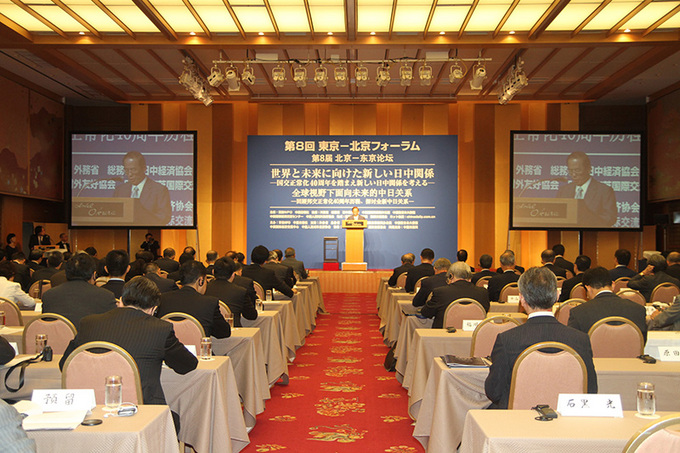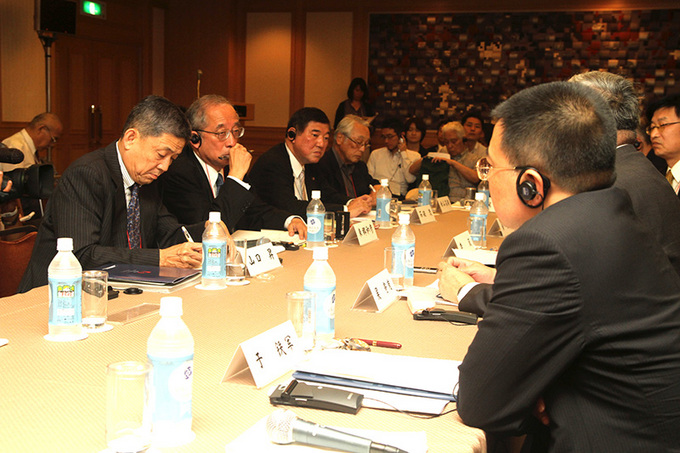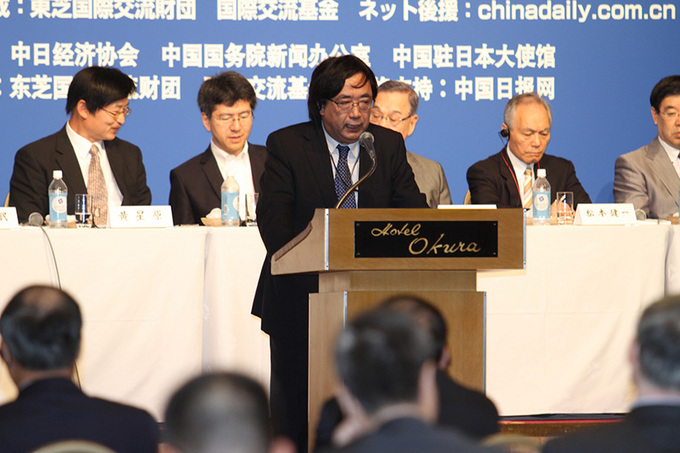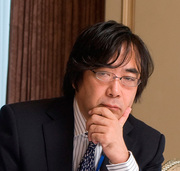Consensus Building to Avoid Military Conflict in a Territorial Dispute
Yasushi Kudo
Representative, The Genron NPO (certified not-for-profit organization)
Japan-China relations once again face a serious crisis, with tensions mounting on both sides. The Japanese government's recent decision to purchase the Senkaku/Diaoyu Islands from a private owner has further fueled Chinese resentment against Japan and sparked widespread anti-Japan protests across China. There have been dozens of reports of mob attacks on Japanese companies operated there.
I said "once again" earlier because seven years ago I witnessed a similar situation unfold in China. Back in 2005, huge rallies broke out in large cities, just as they did recently, and Party leaders were busy placating the young protesters to bring a volatile situation under control. Seeing all happening in China, I flew to Beijing alone and urged the two sides to overcome their divisions through a private-sector dialogue. That was when The Genron NPO, a Japanese think tank, launched the first "Tokyo-Beijing Forum." This annual non-governmental international conference has been held alternatively in the two cities since 2005 and has developed into a pillar of public diplomacy in both countries.
Now, we stand at a critical moment when our wills are being severely tested. What is clear at this point is the need to go back to where we started and take on the challenge to end this escalating crisis.
Non-governmental dialogue to fill the diplomatic vacuum
Before moving on, let me clarify about who we are: The Genron NPO is not a non-profit organization that aims solely to promote friendship between Japan and China. Put simply, we are Japan's only neutral and independent think-tank network whose mission is to help strengthen democracy in Japan through debates and discussions. We generate objective analyses of government policies and develop solutions for issues facing our country.
We launched the project to inaugurate the "Tokyo-Beijing Forum" in 2005, having been aware of a distinct problem in Japan-China relations. As I watched the growing anti-Japan protests in China, I could not help but wonder who could possibly repair the tattered relations between the two countries. Back then, the lines of communication between Japan and China were all but broken. Business leaders shied away from making any comments having fear of economic repercussions, and numerous bilateral exchange programs to foster friendship had been canceled. The media in both countries simply inflamed nationalism by reporting the negative mutual responses. In short, all official diplomatic connections had stalled, leaving nothing but a vacuum. We needed to fill this vacuum and open a new non-governmental dialogue that could address the issues straining the relations between the two countries.
Prior to the annual conference, we conduct a joint public opinion poll in Japan and China, and at the Forum participants engage in candid discussions about a broad range of issues including national security, politics, and economics based on the results of these polls. The debates are open to the public and are attended by key figures, opinion leaders, and intellectuals representing both countries. I suggested earlier that we had to go back to where we started because we now face the same diplomatic void that existed when we first launched this project.
Mutual misunderstandings that lie behind the conflict
The latest standoff was provoked by Tokyo Governor Shintaro Ishihara's announcement of his intention to purchase the Senkaku/Diaoyu Islands from a private owner at a time when a mutual sense of grievance already existed. The row would not have escalated to this level, however, had it not been for critical mutual misunderstandings and a lack of sufficient communication between the two countries.
The Japanese government has argued that its move to purchase the islands should not cause alarm, and its intention was simply to avert any potential havoc that Ishihara's actions could have caused. To begin with, says the Japanese government, the islands have been administered by Japan. To the Chinese government, on the other hand, the move represented a departure from the status-quo and a blatant breach of the tacit agreement both sides had adhered to until now. When Japan and China resumed diplomatic ties in 1972, China contends, it was agreed, as suggested by the Chinese leader at the time, to put aside the islands dispute in pursuit of better overall relations. It only aggravated the situation that Japanese newspapers reported the "nationalization" of the islands on July 7, the day of the Marco Polo Bridge Incident. One can assume that many Chinese perceived Japan's decision as a sign that it was unilaterally reinforcing its control of the islands, given that a good majority of Chinese citizens have not even known the fact that the islands have been under Japanese administration over the last few decades.
A deeper look into the situation reveals a number of underlying factors that have contributed to this crisis. The process of normalizing diplomatic relations between Japan and China was abound with tacit agreements, for example, and whether or not there was in fact an agreement to shelve the islands issue is itself a matter of debate. Another factor is China's strategy to stir up nationalism to divert attention from its domestic problems. Yet another is Japan's lack of a consistent policy in dealing with China, resulting from its inability to find a path to peaceful coexistence with its neighbor that is fast becoming an economic and military superpower. Japan's growing anxieties toward its increasingly powerful neighbor might have also played into the conflict. As complex as it seems, these issues all boil down to mutual misunderstandings and a lack of communication between Japan and China.
Different voices and opinions exist in China
The "8th Tokyo-Beijing Forum" was held in Tokyo from July 1 to 3, 2012. Prior to the event, we released the results of our joint public opinion poll conducted earlier. Two particular aspects of the poll results caught my attention.
The survey indicates that the public's attitude toward Japan-China relations has been steadily declining in both countries. In the latest poll, in particular, the percentage of Japanese citizens who view China unfavorably reached the highest level, at 84%. Although the Japanese media highlighted this figure, I found something else in the report more concerning: a growing number of Chinese respondents--over half in the latest poll--associate Japanese society today with militarism. Shortly before the survey was undertaken, Tokyo Governor Shintaro Ishihara had announced in Washington, D.C. his ambition to purchase the Senkaku/Diaoyu Islands. No doubt his statement had given an impact on the outcome of the poll.
That the Chinese were quick to link Ishihara's statement to military aggression, which to us in Japan sounds extreme, can be attributed to their ignorance about Japan and the influence of biased reports by the Chinese media. The same is true for Japanese people how to view on China. This result illustrates how appallingly little we know and understand each other despite being neighbors.
Something else that requires our attention is how Chinese citizens see the territorial dispute. In this latest poll, we negotiated with our Chinese partners and included a question about the Senkaku/Diaoyu Islands issue for the first time, asking whether they believed a territorial dispute existed between the two countries. The result was that a higher percentage of people made an affirmative response in Japan than in China. What was striking was that nearly 80% of the Chinese who replied with the yes believed that a further escalation of the conflict should be averted through diplomatic negotiations or by putting the issue to rest for the time being. Who represent the real Chinese: the people who favor a peaceful settlement revealed in the poll or the protestors at anti-Japan rallies? Both are real, and what we do know for certain is that people have various views and opinions and that calm minds do exist in China. And I presume those having cooler-headed view are eager to see action taken to prevent the standoff from developing into the worst possible outcome.

The plenary session of the 8th Tokyo-Beijing Forum was held under the theme: Future of Japan-China Relationship under Global Vision--Developing a New Bilateral Relationship to Mark the 40th Anniversary of the Normalization of Diplomatic Relations between Japan and China. Keynote speeches by Yasushi Akashi, Chairman of the International House of Japan and former Under-Secretary-General of the United Nations; Wang Chen, Minister of the State Council Information Office; Yasuo Fukuda, former Prime Minister of Japan and Chairman of the Boao Forum for Asia; and Zeng Peiyan, former Vice-Premier of the State Council were followed by a panel discussion moderated by Yuji Miyamoto, Chairman of the Miyamoto Institute of Asian Research and former Japanese Ambassador to China, and Wang Yiming, Vice President of the Academy of Macroeconomic Research of the National Development and Reform Commission. The panelists included Yasuchika Hasegawa, Chairman of Keizai Doyukai; Yoshimasa Hayashi, Acting-Chairman of the Policy Research Council at the Liberal Democratic Party and a member of the House of Councillors of Japan; Goshi Hosono, Minister of the Environment, State Minister of Nuclear Accident Settlements and Prevention, and State Minister for Nuclear Power Policy and Administration; Zhao Qizheng, Chairman of the Foreign Affairs Committee, of the National Committee of the Chinese People's Political Consultative Conference; Lu Zushan, Vice-Chairman of the Finance and Economic Committee of the National People's Congress; and Wei Jianguo, Secretary-General of the China Center for International Economic Exchanges.

In the afternoon the conference participants were divided into five subgroup sessions on politics, security, economics, local administration, and media organizations. Panelists representing various sectors and industries engaged in in-depth discussions. (Photo above: Discussion session on security)
Why we declare the "Tokyo Consensus"
The 2012 "Tokyo-Beijing Forum" assembled over one hundred opinion leaders and experts from various fields, including politicians, government and military officials, journalists, business executives, academics, and heads of local governments. A total of some 2,800 people participated in the discussions at the five subgroup discussions, covering such topics as security, politics, economics, local administration and media organizations. During the session on security, which I observed over the Internet, whenever the talks became confrontational over the Senkaku/Diaoyu issue, someone from one side or the other would intercede and call for calm, reminding everyone of the purpose of the meeting--"We are here to overcome our divisions." Granted, not all such voices reached the ears of political leaders, but apparently the dialogue was becoming increasingly genuine and honest.
Convening in the year marking the 40th anniversary of the normalization of diplomatic ties between the two countries, we had made two agreements with our Chinese counterparts at the Forum. First was to remove the existing obstacles to achieve forging sound relations. Second was to make a statement at the end of the conference summarizing the results of the discussions and release it as the "Tokyo Consensus."
We identified two issues as key impediments to stable relations: the worsening mutual perceptions between the peoples of Japan and China and the Senkaku/Diaoyu Islands dispute. I drew up the statement based on the agreements reached at the five subgroup discussions, and we named it the "Tokyo Consensus." This was the first time for any agreements reached at the conference to be made public in the form of a declaration. It was done because we concluded the situation called for the participants of both countries to publicly address their commitments and set the direction to which we should be heading.

The "8th Tokyo-Beijing Forum," a two-day conference held in Tokyo, assembled a total of some 100 leaders, intellectuals, and experts from Japan and China to discuss issues of mutual interest ranging from politics, economics, security, local administration, and public sentiments toward each other's country. The agreements reached at the Forum were stated into a document entitled the "Tokyo Consensus," a proposition by the Japanese and Chinese private sectors, aiming for further development of the Japan-China relationship.
Agreement to discuss the territorial issue at the private-sector level
The Tokyo Consensus first defines the Forum's resolves for the future. It pledges to continuously explore the paths to achieve long-term shared prosperity, rather than being distracted by the short-term issues at hand. Reminding ourselves never to lose sight of the ultimate goal, which is to build strong, trusting relations between Japan and China, the document expresses our will to spare no effort in finding practical solutions to any and all disputes. Recognizing that the role of our private-sector exchange and dialogue is to complement official diplomacy, the declaration also expresses the intention of the Forum to take up any problems that government negotiations have difficulty in resolving and to act as a catalyst to address and solve pressing challenges between the two countries.
Based on these commitments, the Tokyo Consensus makes two suggestions to help settle the territorial dispute. First, it proposes the governments of Japan and China to establish a firm mechanism for managing crisis and controlling the situation in order to prevent a minor discord from developing into a full-blown confrontation. Second, it promises to continue the dialogue between Japan and China, aiming to prevent the territorial dispute and other sensitive issues from aggravating mutual resentment. At the Forum, it was also agreed to launch a joint research project to tackle these challenges and report its results at the next meeting. In that way, we thus established a non-governmental framework to address the territorial dispute.
Avoiding military conflict in the territorial dispute
The ensuing events surrounding Japan-China relations show that this dialogue has failed to live up to its mission. The private-sector agreement, nevertheless, has potential like the spider's silk that is seemingly fragile but resilient. The question is how can we leverage the dialogue to steer the latest row away from the worst possible outcome? We are aware, of course, of the extreme difficulty involved. The competing claims of sovereignty over the islands are, however, one aspect of the crisis. Japan must tackle the wider challenge to coexist with an emerging superpower, namely China. In this environment we need to build a sophisticated relationship which can achieve maximized mutual benefits while acknowledging each other's differences.
The Japanese government maintains their claim throughout that there is no territorial dispute between Japan and China over the Senkaku/Diaoyu Islands. I can appreciate that a sovereign nation would refuse to give up what it considers to be its territory; one would expect that from any government. However, there would not be common ground as long as both sides cling to their own logic and refuse to budge. If both maintain the current course of action, violent clashes would be inevitable.
My personal view is that the political leaders would not be able to settle the dispute under the current climate. Not anytime soon, at any rate. As we proposed in the Tokyo Consensus, we need a new channel of dialogue, one that is separate from the government-to-government approach, if only to remedy the current stalemate. The only way going forward is to detach the issue from politics, cool down our heads for a while, and work to put the problem back into Pandora's Box sometime in the future.
As the two countries stand embroiled in a deep confrontation, we need to set an entirely new goal: to reach an agreement, not allowing the territorial dispute to erupt into an armed conflict at any cost. The Genron NPO intends to lead the efforts to build these and other international consensuses from a private-sector standpoint.
* Organizations/ posisions of the people mentioned in the article are as of the time of writing (September 2012).
 Yasushi Kudo
Yasushi Kudo
Born in 1958. Obtained a master's degree from the Graduate School of Economics of Yokohama City University. Kudo currently serves as managing editor of the magazines Financial Business and Debate: Toyo Keizai at the publisher Toyo Keizai, Inc. In October 2001 he founded The Genron NPO, an independent and non-partisan think tank whose mission is to create a forum of responsible, high-quality discussion that the existing media has failed to provide. Serving as non-profit organization's representative, Kudo has since conducted assessments of political party platforms and the administration's performances and engaged in various policy debates. In 2005 he established the Tokyo-Beijing Forum, a non-governmental dialogue between Japan and China. In March 2012, The Genron NPO was selected to be a member representing Japan on the Council of Councils, a nineteen-member policy institute network launched by the U.S. Council on Foreign Relations (CFR).
Related Events
Back Issues
- 2022.11. 1 Inner Diversity<3> <…
- 2022.9. 5 Report on the India-…
- 2022.6.24 The 48th Japan Found…
- 2022.6. 7 Beyond Disasters - …
- 2021.3.10 Crossing Borders, En…
- 2020.7.17 A Millennium of Japa…
- 2020.3.23 A Historian Interpre…
- 2019.11.19 Dialogue Driven by S…
- 2019.10. 2 The mediators who bu…
- 2019.6.28 A Look Back at J…

